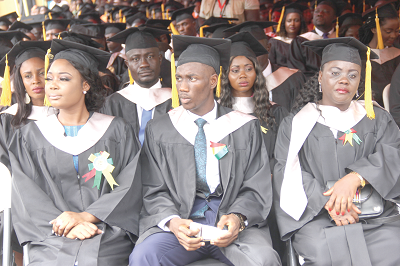
Three partner to set up waste recycling plant in Koforidua
George Folley
Education
3 minutes read
The All Nations University College (ANUC) in Koforidua in the Eastern Region is collaborating with the New Juaben Municipal Assembly and Zoomlion Ghana Limited to recycle waste in the municipality under the One-district, One-factory (1D1F) initiative.
In furtherance of the project, the university has released land to Zoomlion to build its regional offices, a mobile recycling plant for solid waste, a liquid waste treatment plant, a sanitation management institute, among other facilities, in Koforidua.
The President of the ANUC, Dr Samuel Donkor, announced this at the 22nd graduation ceremony of the university in Koforidua last Saturday.
In all, 469 graduands were presented with certificates after completing courses in various areas of study.
The graduation ceremony was on the theme: "Pursuing excellence in higher education through science and technology for achieving the Sustainable Development Goals (SDGs)”.
Dr Donkor said the partnership between the ANUC and Zoomlion would be extended to cover the training of both academic persons and sanitation experts for Ghana and the West African sub-region.
He said the partnership would also result in the establishment of a Zoomlion School of Environmental Engineering and Agricultural Sciences to roll out programmes such as Bachelor of Engineering in Environmental Sciences and Bachelor of Engineering in Food Processing.
Contribution to SDGs.
According to Dr Donkor, since 2012 the ANUC’s Space System Technology Laboratory (SSTL) had undertaken projects and carried out activities focused on promoting the achievement of the SDGs, including quality education and gender equality.
He said in 2017 SSTL engineers, in collaboration with the Kyushu Institute of Japan, successfully launched Ghanasat 1 into orbit, a development which had helped Ghana leap ahead of other countries in sub-Saharan Africa.
"This outstanding demonstration of innovation is at the core of the ANUC's quest to explore space science to solve societal problems," he said, adding that the university was poised to launch Ghanasat 2 next year.
Quality education
On education, Dr Donkor said: "In our effort to promote quality education, the SSTL team has used space science and satellite technology to promote science, technology, engineering, mathematics and innovation, including educative outreach programmes for senior high school students."
He said the team had so far reached out to over 3,000 students drawn from 40 selected districts in the country.
Dr Donkor said it was the vision of the university to spread its SDG promotion agenda using satellite technology to all the 275 constituencies in the country.
New programmes
Dr Donkor hinted that plans were underway for the university to establish a School of Graduate Studies next year, now that key staff were in place.
Additionally, the university intended to offer blended learning model options to supplement course readings and activities with online articles, simulations, events and other resources.
He announced that the university had also received accreditation to run a Bachelor of Science degree in Nursing.
Daasebre Oti Boateng
The Paramount Chief of the New Juaben Traditional Area, Daasebre Oti Boateng, for his part, said the ANUC had attained global iconic status in science, technology and innovation through the successful launch of Ghana's first satellite.
It was his view that the country could harness that achievement to draw up a science, technology and innovation planning framework for the implementation of the 17 United Nations SDGs.
Daasebre Boateng, who is also the Chancellor of the university, commended the leadership of the ANUC for its commitment to achieve academic excellence, driven by a globally competitive spirit to put Ghana on the global map of science and technology.
